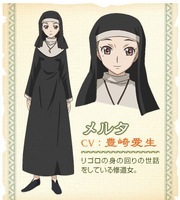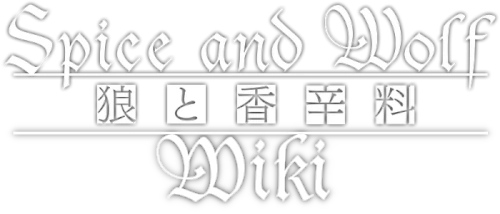No edit summary |
|||
| Line 1: | Line 1: | ||
| − | The Church is a powerful but weakening organization within the ''Spice and Wolf'' universe. Although what religion the church practices is never explicitly mentioned, it is heavily implied that the institution is based on the Roman Catholic Church of the middle European ages. The connections to this tradition are made by the recognizable regalia worn by nuns, average priests as well as high-ranking churchmen. There is also a reference in the very first episode of a "Holy Father" as the |
+ | The Church is a powerful but weakening organization within the ''Spice and Wolf'' universe. Although what religion the church practices is never explicitly mentioned, it is heavily implied that the institution is based on the Roman Catholic Church of the middle European ages. The connections to this tradition are made by the recognizable regalia worn by nuns, average priests as well as high-ranking churchmen. There is also a reference in the very first episode of a "Holy Father" as the Pope would be spoken of in our world. Furthermore, several apparently recognizable scriptures are quoted in a number of the anime episodes. On the other hand, there remains a strong ambiguity in what church is truly being portrayed in this world. |
==Not Always a Match== |
==Not Always a Match== |
||
Revision as of 17:32, 17 October 2013
The Church is a powerful but weakening organization within the Spice and Wolf universe. Although what religion the church practices is never explicitly mentioned, it is heavily implied that the institution is based on the Roman Catholic Church of the middle European ages. The connections to this tradition are made by the recognizable regalia worn by nuns, average priests as well as high-ranking churchmen. There is also a reference in the very first episode of a "Holy Father" as the Pope would be spoken of in our world. Furthermore, several apparently recognizable scriptures are quoted in a number of the anime episodes. On the other hand, there remains a strong ambiguity in what church is truly being portrayed in this world.
Not Always a Match
Although places of worship, in their architecture, are like Cathedrals with their high towers--as in our European tradition—the viewers' eyes never go to the top of those towers, and crosses are never shown. Moreover, the nun Merta, shown below, does not wear a cross but what appears to be a hand-held scythe around her neck. Readers and viewers should remember a similar experience of institutions, which call themselves "the church" but may, in fact, be very different from the institution called the church here. Such as in the case, for example, in The Golden Compass.
Great Power that is Usually Oppressive and Growing
The Church's influence in Lawrence's and Holo's world is vast and great; anything the Church says people must obey, even the king. It is also portrayed in a primarily negative manner. In the first episode of the anime, "Wolf and Best Clothes," Lawrence has a stiff conversation with a soldier who clearly, as also a member of the church, wants a heavy hand to brought down on the pagans living in nearby in Pasloe. The knight complains that the authorities, including the Holy Father, are choosing to do nothing about it. Lawrence keeps his conversation neutral but then makes his way on to Pasloe itself, which is in a happy mood of festival. (As Lawrence arrvies we hear lively music with flute and recorder). He meets friendly townspeople sharing drink as well as the pretty Cheo. It is only later that the viewer learns that the townspeople think of their "god" as a fun myth rather than a true deity. Still of the two, pagans come across as a lot more pleasant to be around than members of the church.

Actual Beliefs?
As to specific tenets of belief of the Church, not much is said. There is the expected disapproval of alternative faiths, such as paganism. There is also the important concept of sexual morality and of marriage. Any system the Church views as heretical will have serious problems in the future, considering the various historical references the series make. This first became apparent during coin speculation/insider trading incident in which the Medio Trading Company kidnaps Holo and uses her as leverage to make Milone Trading Company look like Heretics.
Shepherdesses and Nuns

There are very few positive figures dedicated to the church.Nora Arendt is a former nun although she is apparently still a devout believer as Lawrence, himself is too (an interesting situation with a goddess as his business partner). See her entry on this wiki for the blessing Nora gives to Lawrence which gives some sense of how "nun-like" she remains even as a shepherd. The prayer us under "Skills." While showing the spiritual side of Nora the prayer also illustrates the ambiguity of the Church's beliefs. This quote is interesting. By the blessing of God in the heavens, By the protection of the spirits of the land, The word of God is carried on the wind, And the blessings of the spirits of the land Inhabit the very grass eaten by the lamb." This is a beutiful thing but it is certainly not Catholic-Christian or Jewish.
Neither faith speaks of communication with the spirits of wind or land in canonical texts. There is a long tradition of spirits in the Talmude, and as Jay Michaelson notes within in his online article: "The Talmud has a rich, though vague, demonology. But these are viewed as powers to control not to be communed with, Meanwhile in Christian texts Satan is, in fact, called the "prince of the power of the air" in Ephesians 2:2. This once again brings to light that the church within the world of Spice and Wolf has some fundamental differences from the spiritual beliefs of the Earthly institution here it resembles. It is especially interesting that within Nora's prayer there seems to be room in her conservative belief system for spirits of power--which is fortunate since Holo is standing right beside her (or drinking across her at table). Holo herself does not seem to be bond to even the term "god" to describe herself. As she tells Lawrence at one point "I am not so grand, not as a god. I am Holo, and Holo is all that I am." (Season 1, Episode 1)
Getting back to the religious connection of shepherds to what many would recognize as Christianity, there is, of course, the fact that shepherds play a strong role even throughout Biblical narratives. King David's 23rd psalm, "All we like sheep have gone astray" (Isaiah 53:6) the sheperds who came to the manger (Luke 2:8-14), and even Christ's own claim as a "good sheperd" (John 10: 11-18) all illustrate the strong traditiononal, spiritual connection with this profession. Even the word "Pastor" which among protestants means the leader of a congregation comes from the same pastoral term of shepherd (see the range of definitions at theFree Dictionary).

However, it is the nun Merta, who works with the scribe Ligro as a librarian, who is both sweet and intelligent (and quite pretty--with eyes like Nora) who provides the one positive representative of this faith. Thus at the very end of the anime series in episodes 11 and 12 the viewers are introduced to a positive churchwoman, but she stands in contrast to the ecclesiastic political positioning going on in the Renos in which the merchant Eve finds herself dealing with corrupt and ambitious churchmen in the same episode.
See Also
- Ruvinheigen - a city run by the church

Merta the nun who works as a librarian for the scribe.

